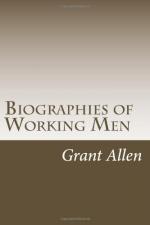At our very doors, however, there is a small nation of largely different blood and of wholly different speech from our own; a nation forming a part of our own kingdom, even more closely than the Scotch or the Irish, and yet in some respects further from us in mind and habit of life than either; a nation marked rather by the poetical and artistic, than by the mechanical and practical temperament—the ancient and noble Welsh people. It would hardly be reasonable to expect from the Welsh exactly the same kind of success in life which we often find in English workmen; the aims and ideals of the two races are so distinct, and it must be frankly confessed the advantage is not always on the side of the Englishman. The Welsh peasants, living among their own romantic hills and valleys, speaking their own soft and exquisite language, treasuring their own plaintive and melodious poetry, have grown up with an intense love for beauty and the beautiful closely intwined into the very warp and woof of their inmost natures. They have almost always a natural refinement of manner and delicacy of speech which is unfortunately too often wanting amongst our rougher English labouring classes, especially in large towns. They are intensely musical, producing a very large proportion of the best English singers and composers. They are fond of literature, for which they have generally some natural capacity, and in which they exercise themselves to an extent unknown, probably, among people of their class in any other country. At the local meetings of bards (as they call themselves) in Wales, it is not at all uncommon to hear that the first prize for Welsh poetry has been carried off by a shepherd, and the first prize for Welsh prose composition by a domestic servant. In short, the susceptibilities of the race run rather toward art and imagination, than toward mere moneymaking and practical ingenuity.
John Gibson, sculptor, of Rome, as he loved to call himself, was a remarkable embodiment, in many ways, of this self-respecting, artistic, ideal Welsh peasant temperament. In a little village near Conway, in North Wales, there lived at the end of the last century a petty labouring market gardener of the name of Gibson, who knew and spoke no other tongue than his native Welsh. In 1790, his wife gave birth to a son whom they christened John, and who grew up, a workman’s child, under the shadow of the great castle, and among the exquisite scenery of the placid land-locked Conway river. John Gibson’s parents, like the mass of labouring Welsh people, were honest, God-fearing folk, with a great earnestness of principle, a profound love of truth, and a hatred of all mean or dirty actions. They brought up the boy in these respects in the way he should go; and when he was old he indeed did not depart from them. Throughout his life, John Gibson was remarkable for his calm, earnest, straightforward simplicity, a simplicity which seemed almost childish to those who could not understand so grand and uncommon and noble a nature as his.




